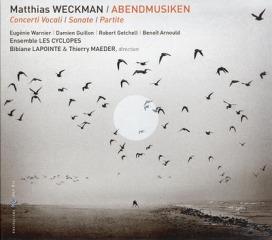Matthias Weckman – Abendmusiken (2010)
Matthias Weckman – Abendmusiken (2010)

1. Wie liegt die Stadt so wuste, 16:18 2. Sonate a 4 No. 2, 4:59 3. Weine nicht, 12:58 4. Komm, heiliger Geist, Hene Gott, 8:31 5. Sonate a 4 No. 9, 6:14 6. Partita in D minor for harpsichord, 7:24 7. Wenn der Herr die Gefangenen zu Zien, 10:18 Les Cyclopes (Ensemble): Eugenie Warnier - soprano Damien Guillon - counter-tenor Robert Getchell - tenor Benoit Arnould - bass Olivia Centurioni, Guadaluppe Del Moral, Reynier Guerrero - violons Lucile Boulanger, Marion Martineau, Mathilde Henin Vieillard-Baron - violas da gamba Bibiane Lapointe - harpsichord Thierry Maeder - organ Frithjof Smith - cornettino Stefan Legee - trombone Jeremie Papasergio - bassoon Bibiane Lapointe & Thierry Maeder – direction
This is a beautiful, stylish, transparent and thoroughly enjoyable hour's worth of early Baroque chamber choral and instrumental music by Thuringian composer Matthias Weckman. He was born in 1616 and died 11 years before Bach was born in the same region. A pupil and protégé of Schütz in Dresden and Jacob Praetorius in Hamburg, Weckman was also familiar with Tunder and Froberger. He travelled widely in northwestern Europe leading something of an illustrious professional life and being responsible for several innovative musical currents - both in terms of compositional style and instrumental practice. Given the profoundly moving and technically exacting music which we know Weckman to have written, it's surprising that so little of this currently exists in recordings … only a handful of CDs are available.
Weckman was obviously a confident, dedicated and rounded musician. Colour, precision, invention, practicality, unabashed responsiveness (to the horror of the Thirty Years War, the plague and death in other forms) to the world, and a determination to accentuate his redeeming faith all characterise the music of a composer who's due for greater attention if anyone of the period is.
The seven substantial pieces on this CD present a rounded picture of Weckman's output. Wie liegt die Stadt so wüste [tr.1] laments the state of a city laid low by disaster. Using text from the 'Lamentations of Jeremiah', it nevertheless advances optimism as a possibility. The two Sonatas [tr.s 2, 5] are none the less affecting for lacking words. Their drive, textures and dogged clinging to the themes elaborated at their starts suggests determination (in the face of fate, disaster, loss, misery) every bit as much as the closing cantata, Wenn der Herr die Gefangen zu Zion erlösen wird [7]; while the solo organ and harpsichord works [tr.s 4, 6] only add to the sense that Weckman could and did turn his hand to anything. Indeed, the defiant Weine nicht, es hat überwunden [tr.3] adds to the sense that Weckman is a composer of comprehensive and far-reaching skills as capable of meeting a range of challenges as most of his contemporaries. This latter work, apparently, was written in response to a rebuff from his Kantor: Weckman returned home, opened the Bible at random and set the text which he saw - almost in retaliation.
Obviously an astute musical 'operator', diplomat, student and quick and flexible learner, we are probably just as impressed by the rich and highly satisfying legacy of compositions which Weckman has left us as we are by that musicianship. Here Les Cyclopes and an array of extremely proficient soloists under conductors Bibiane Lapointe and Thierry Maeder show Weckman to his very best. Their pacing and tempi never labour the point that Weckman was reacting to events around him (as were so many European composers in the mid seventeenth century). Rather they put him in full control. The delicacy and precision of the solo pieces - particularly the harpsichord Partita - give no hint of stridency or bombast. Yet convey the sense of predation and overwhelming sadness with which so many had to respond to events; and without indulgence or spectacle.
The singing is measured, controlled and flexible. Yet lacks nothing in fervour and commitment. Benoît Arnould's baritone is particularly pleasing. But there is a togetherness and sense of familiarity, purpose and confidence in the ensemble work that only advances Weckman's cause at every turn. The order - and aforementioned variety - of these seven gems of works also enhance our sense of attending a rather special recital, imaginatively conceived, immaculately prepared, intelligently performed. What's more - and this is important - the performers make few or no assumptions about the possible range of receptions on the part of listeners who are familiar, struck, attracted to and likely to seek out more of this special yet neglected composer.
Rather, Les Cyclopes and soloists unswervingly let Weckman speak for himself. Let the beauty, unstudied intricacy coupled with untrammelled clarity in the interests of impact affect us each in our different ways. But the performers never allow us to ignore the gifts that Weckman possessed. They were many. So it's to be hoped that this bright release from the equally enterprising Zig-Zag Territoires will generate enough interest in Matthias Weckman for much more of his understated yet highly affecting music to become available on CD.
The acoustic is close though not oppressive. The booklet in the nicely-designed 'Digipak' is informative and provides a useful introduction to this composer who - solely on the evidence of this CD - deserves to be much better known.
A real find then: the ever-adventurous Zig-Zag Territoires continue to present performances of otherwise out-of-the-way repertoire to the advantage of anyone open to new experiences. In this case, only delight can be the result. -- Mark Sealey, MusicWeb International
download: uploaded anonfiles yandex 4shared solidfiles mediafire mega filecloudio
Zmieniony (Poniedziałek, 04 Listopad 2013 17:08)








